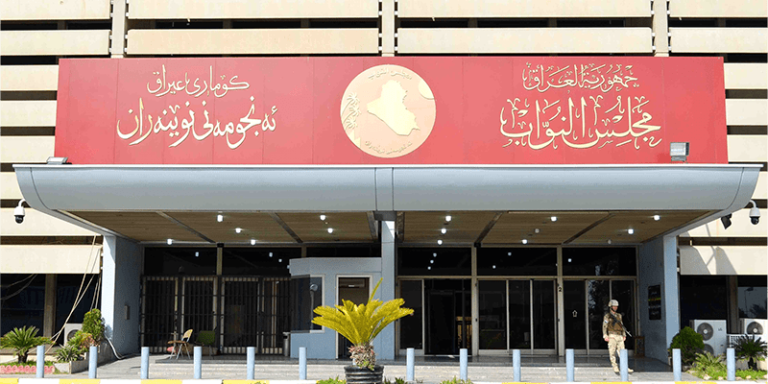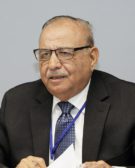
Iraq’s fourth parliament since the 2003 American invasion will convene in regular session on September 3, amid confusion and speculation about the formation of a new government after parliamentary elections last May. Competition is fierce between two large groupings of political forces: the Moving Forward coalition, headed by Shia cleric and firebrand Muqtada al-Sadr—who is not a member of parliament––and the alliance of Hadi al-Amiri’s Conquest gathering and Nouri al-Maliki’s State of Law coalition. The process of forming the government was made more complicated by the diffusion of the election results and the breakup of former large coalitions, two facts giving small lists and independents disproportionate power and influence.
The Moving Forward coalition, with 54 seats, cannot form a government alone; thus it must forge alliances with disparate groups to control at least 163 seats to assure a majority in parliament. Its natural ally is current caretaker and Shia politician Prime Minister Haider al-Abadi, whose Victory coalition won 42 seats. He is a moderate and supported by the United States and the neighboring Gulf Arab states. To assure additional support, the two groups would need to find other allies among small lists headed by traditional political actors who lost much support in the elections, such as Iyad Allawi, Masoud Barzani, Khalifa Talabani, Osama al-Nujaifi, and Saleh al-Mutlaq, to name a few. In other words, if Moving Forward forges alliances with some or all of these leaders, in effect it would be reproducing the old political formula against which the voters revolted in the recent elections.
The Conquest gathering combined with the State of Law coalition together would suffer from a similar problem, except that they would control fewer core seats, since Conquest won 48 seats and State of Law won 26, for a total of 74 seats. As the two major parties that represent the pro-Iran political Shia trend in Iraq, they are unable to secure any support from Sadr or Abadi loyalists. Amiri is the leader of the pro-Iran Popular Mobilization Forces (PMF) while Maliki, also pro-Iran, is tainted with corruption and a record of failing to defend the country against the Islamic State when it swept Iraq’s borders with Syria in 2014.
Both the Moving Forward–Victory alliance and the Conquest–State of Law alliance are limited to striking deals with thus far unaffiliated forces. One of these is the Nationalist Axis, a 51-member coalition newly formed by the Sunni tribal leader and businessman Khamis al-Khanjar, from among Sunni and other representatives. However, one characteristic of this coalition is its marginality and transactional approach in looking for benefits and deals without adherence to an overarching political program. Any agreement with this coalition thus appears to be fraught with instability since its members seem to be ready to follow their immediate interests instead of protecting the interests of a larger coalition.
Then there are the Kurdish factions that could also be crucial coalition partners, with the added caveat that they are not monolithic or unified in their programs and interests. The Kurdistan Democratic Party of Masoud Barzani won 25 seats in the elections, followed by the Patriotic Union of Kurdistan of Talabani with 18, and the Gorran (Change) Movement with 5. Their potential coalition building depends on several issues, namely, their intra-Kurdish rivalries and commonalities, their control of Kurdish political life, and their relationship with the central government in Baghdad.
Finally, the Iraqi political process is interlinked with where Iraq stands regarding American-Iranian relations, which at present are fraught with problems. On previous occasions, there was general—albeit not publicly acknowledged—coordination between Washington and Tehran regarding who can be an effective prime minister in Baghdad. In 2010, the Obama Administration supported the Iran-approved Nouri al-Maliki for the post despite his coming in second in that year’s elections. His tenure, however, was characterized by corruption, sectarian divisions, and a failure to defend against the Islamic State. When he wanted to renew his term for a second time after the 2014 parliamentary elections, Washington threw its support behind Haider al-Abadi and secured Tehran’s acceptance of the latter.
This time around, there does not appear to be much room for American-Iranian coordination on selection of the Iraqi prime minister or the nature of his cabinet. The Trump Administration has confidence in Abadi and would like for him to lead a new government, but Iran prefers other personalities, such as the PMF’s Amiri. But as the United States increases pressure on Iran, it is hard to see how a pro-Iran politician can govern Iraq while US troops continue their mission in Iraq against Islamic State.
It is thus logical to conclude that Iraq’s new prime minister will be Abadi and his government will be based on a Moving Forward–Victory coalition that can muster 96 seats. The parties to ensure this coalition’s supremacy and stability will most likely be the Kurdistan Democratic Party with a smattering of leaders of small lists and willing personalities from the National Axis. What can be sure, moreover, is the fact that the opening session of Iraq’s parliament on September 3 will be a raucous occasion during which Iraq’s domestic rivalries and the American-Iranian competition in Iraq will go on full display.

